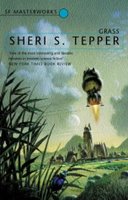Some writers just deserve a short introduction before I post anything of their work. Among them are Philip K. Dick and Kurt Vonnegut. But today I'll start with one of the early and in some ways forgotten writer H.G. Wells.
The thing about H.G. Wells is that he still wrote in a Victorian style, and in my opinion it is almost unique to find that beautiful old English of R.L. Stevenson or O. Wilde in a so-called Science Fiction book. It's a pity he only managed to write one earth-shocking masterpiece: The Time Machine. Some will disagree and say The War of the Worlds, The Invisible Man or The Island of Dr. Moreau are also great. In my opinion, they are fun, not great. Unlike J. Verne's predictions of the future, H.G. Wells wrote one book that nowadays is totally outdated and therefor fun: The First Men in the Moon. Not one scientific fact in that novel is in agreement with our scientific knowledge of today.
The Time Machine is now widely known by the public: a few years ago a second movie was made out of Wells' novel (Guy Pierce, remember?). But none of the movies have ever captured my mind like Wells' novel that was written in 1895. The 29 year old Wells succeeded with a single typewriter where modern technology failed (twice). Maybe it is true that the world we create within our minds when we read novels cannot be equaled by any modern movie.
Many writers of today are influenced by Wells. One of them for sure is Michael Moorcock. Moorcock's work is always just over the top in that he mocks the Holy Mary or parts of our "descent" society. Last year I was lucky to find a copy of The Complete, Uncensored Saga of Jerry Cornelius in Canada (yeps, sometimes you have to travel to the other side of the world to find a book like that), a book that was once banned in most catholic countries. When I've read it, I'll surely post something about it. But back to Wells: for people who want to know a bit about Wells, but don't like reading biographies, just read Moorcock's The Dancers at the End of Time. The historic H.G. Wells is one of the characters in the book.
Labels: H.G. Wells
 The book is certainly better than the movie! Now I come to think of it: I've never seen a good movie based on Well's books: The Time Machine, The War of the Worlds, The Invisible Man and The Island of Doctor Moreau aren't good movies (except the old version of The War of the Worlds). So I don't expect people reading his books. The Time Machine is certainly his best work, and The Island of Doctor Moreau is very enjoyable. Although a bit dated, the central theme is still very - and maybe more - actual now. And the beauty of Wells is that he writes in that beautiful old English:
The book is certainly better than the movie! Now I come to think of it: I've never seen a good movie based on Well's books: The Time Machine, The War of the Worlds, The Invisible Man and The Island of Doctor Moreau aren't good movies (except the old version of The War of the Worlds). So I don't expect people reading his books. The Time Machine is certainly his best work, and The Island of Doctor Moreau is very enjoyable. Although a bit dated, the central theme is still very - and maybe more - actual now. And the beauty of Wells is that he writes in that beautiful old English:

